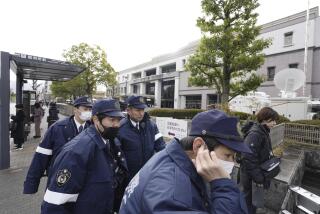Death Sentence Upheld for 2 Japan Radicals
- Share via
TOKYO — The Supreme Court upheld death sentences Friday for two Japanese Red Army members, including a woman known as the “Bloody Empress,” who led an internal purge two decades ago that left 17 people dead and Japan’s ultra-leftist movement in tatters.
The high court also dismissed an appeal of a 20-year sentence given to Yasuhiro Uegaki, a lower-ranking Red Army member convicted in the slaughters.
Hiroko Nagata, 48, and Hiroshi Sakaguchi, 46, leaders of the United Red Army, were sentenced to die for murdering 14 other radicals who had questioned the group’s dogma or tried to quit.
Most of the victims, tried in what the prosecution called “revolutionary kangaroo courts,” were beaten, tied up and left outside to freeze to death. Others were tortured and hanged.
The executions were carried out as group members moved from one mountain hide-out to another in a desperate attempt to elude police that began in August, 1971.
The chase ended in February, 1972, when police raided a mountain villa 100 miles north of Tokyo where five United Red Army radicals had held a hostage for 10 days.
Two police officers and one bystander were killed in the raid, broadcast live on national television.
Police eventually arrested 17 Red Army members in the killings. Sixteen were found guilty and 11 received prison terms ranging from four years to life.
The murders shocked the nation and contributed to the decline of the radical left, which had successfully exploited popular anger against a U.S.-Japan security pact and the worldwide student unrest of the 1960s.
The Red Army, which was also responsible for the attack at Tel Aviv’s Lod Airport in 1972 that left 26 people dead, never recovered from the internal war and has virtually vanished.
Police believe that only about 30 Red Army members remain. All live in exile in the Mideast and North Korea.
The Supreme Court panel of five judges hearing the case dismissed arguments by the lawyers for Sakaguchi and Nagata that the death penalty is cruel and unconstitutional.
Nagata earned the nickname “Bloody Empress” in the late 1970s when she proudly told the court her occupation was a “revolutionary” and defended her motives for killing her comrades.
There are 58 prisoners on death row in Japan. The most recent execution reportedly took place in 1989. The government does not announce executions, which are usually carried out by hanging.
Friday’s court ruling was handed down on the 21st anniversary of the beginning of the police siege of Red Army commandos at a hotel on Mt. Asama, north of Tokyo.
Commenting on the case’s snail pace, a hallmark of Japan’s antiquated court system, Justice Minister Masaharu Gotoda said: “Trials just last too long. I must offer my condolence to the families of the victims.”
More to Read
Sign up for Essential California
The most important California stories and recommendations in your inbox every morning.
You may occasionally receive promotional content from the Los Angeles Times.













